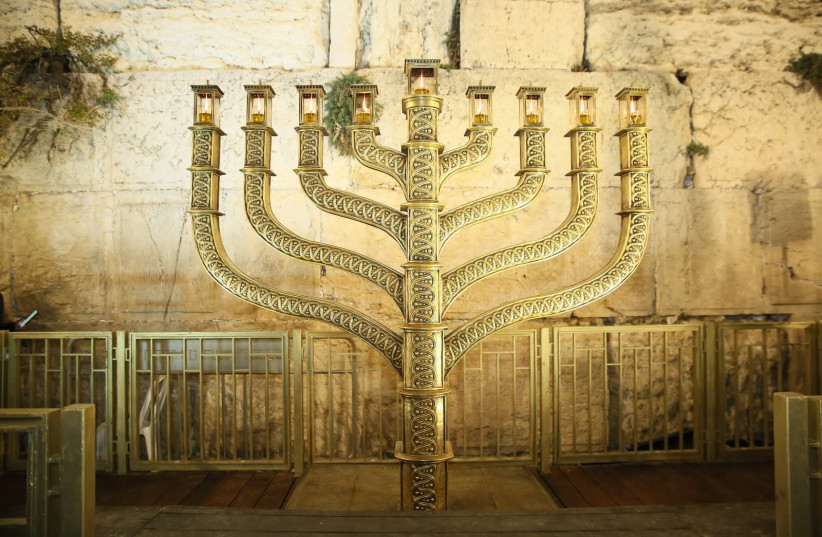Our country is now taking so steady a course as to show by what road it will pass to destruction, to wit: By consolidation of power first, and then corruption, its necessary consequence.
–Thomas Jefferson
At the beginning of this week’s Torah portion Beha’alotcha, we read that Aaron the high priest was charged with the daily lighting of the menorah.
Rashi, explaining the connection between the end of last week’s portion dealing with the princes bringing their offerings to this week’s beginning, says: “When Aaron saw the inauguration of the princes, he felt bad about it, for neither he nor his tribe was with them in the inauguration. The Holy One Blessed is He, said to him, ‘By your life! Your role is greater than theirs, for you kindle and prepare the lamps,’” (Rashi on Bamidbar 8:2).
The Ramban asks the question of why God didn’t console him by saying that he gets to offer the twice-daily offering of the incense and/or he gets to enter the Holy of Holies on Yom Kippur. He suggests “that the consolation offered to Aaron was not the fact that the high priest would kindle the menorah daily during the duration of the Temple service.
Rather, the consolation was that the menorah would be kindled in all generations as a result of the heroism of Aaron’s descendants, the Hashmonaim priests. In other words, the consolation alludes to the Hanukkah Menorah which will continue to be lit, even after the suspension of the Temple service.

Rabbi Yissocher Frand writes, “This is saying that there are times in life when we do things in a non-dramatic fashion without a lot of fanfare, but those little things can last for generations, for centuries, even for millennia. Other times, we do things with great fanfare and great pomp and circumstance, but those things are forgotten shortly and have no lasting importance. The sacrifices of the princes were offered with great pomp and circumstance, but they were a one-time affair, and they were only for the Mishkan. The Mishkan was eventually put away and the whole dedication ceremony had no permanent impact. Aaron’s kindling of the menorah was not only for now, not only for later but for eternity.”
In a little more than a month, we read about the revelation of who will replace Moses as leader of the nation. As I have written previously, the leading candidates to inherit the leadership position would either be one of the sons of Moses, or Pinchas.
One of the sons, because often leadership is passed from father to son, and Pinchas, as it says, “turned back my wrath from upon the children of Israel when he zealously avenged me among them, so I did not consume the children of Israel in my vengeance. Therefore say: Behold! I give him my covenant of peace,” (Bamidbar, 25:11-12).
Such a bold and heroic action would certainly put him in the running for leadership, and the nation would get behind him as they were saved from death by his zealousness.
As a surprise, Yehoshua, the servant of Moses, was chosen. I once heard Rabbi Shalom Gold z”l being asked what quality Yehoshua possessed that merited his being chosen to lead. He answered that if you look at the juxtaposition of verses, immediately after his being chosen, we have the section that deals with the daily offering in the Temple, the tamid.
One lamb was offered in the morning and the second was offered in the afternoon. He said that it was the day-in, day-out commitment that was important for leadership, not a one-time heroic event.
Far too often, I get a phone call from a client asking for a “hot” stock tip. Much research has shown that the key to portfolio growth is asset allocation, or how you break up your portfolio into various assets, and not stock picking. Data shows that over 90% of all portfolio returns come from asset allocation. This means that stock picking has little impact on your investment returns.
Living within your means, saving, and investing are the time-tested methods to achieve financial security. Slow and steady portfolio growth over the long haul makes all the difference. Trying to find the one stock to put all your money into to try and hit a grand slam and become a millionaire isn’t a well-thought-out financial plan.
I’ve written numerous times about a friend who, during the go-go days of high-tech in the late ‘90s, decided that he was going to put all his hard-earned money into Nokia stock and become a millionaire. Well, he made it to almost $800,000, the bubble burst, and 22 years later, it’s still 90% lower.
I may sound like a broken record but those who keep their eyes focused on the long term end up doing well financially. Define your goals and needs and then invest with an allocation that will help you achieve those goals. Don’t get caught up in trying to time the stock market; buy good-quality assets and hold them instead.
The information contained in this article reflects the opinion of the author and is not necessarily the opinion of Portfolio Resources Group, Inc. or its affiliates.
Aaron Katsman is the author of the book Retirement GPS: How to Navigate Your Way to A Secure Financial Future with Global Investing (McGraw-Hill), and is a licensed financial professional both in the United States and Israel, and helps people who open investment accounts in the United States.
Securities are offered through Portfolio Resources Group, Inc. (www.prginc.net). Member FINRA, SIPC, MSRB, FSI. For more information, call (02) 624-0995 visit www.aaronkatsman.com, or email aaron@lighthousecapital.co.il
